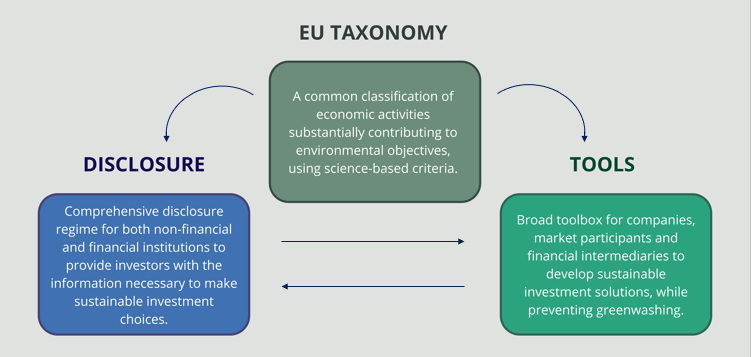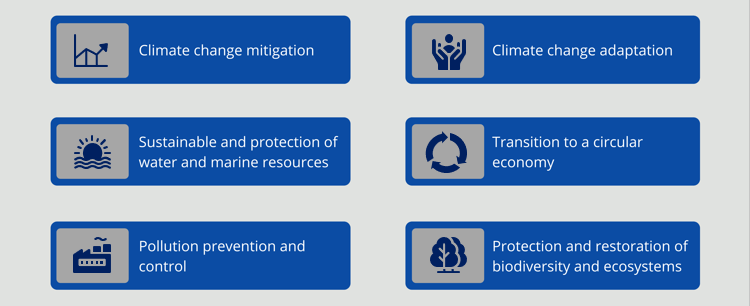The coincidence in time and the multiplicity of initiatives aiming to reinforce the actions to fight climate change and the achievement of EU Green Deal objectives are nothing but the reflect of this sense of urgence that shapes public policies, guides regulatory processes and motivates the different political positions in order to make it possible.
Last 16th of September, the International Chamber of Commerce held the PreCOP2021 Forum on “Global Challenges, International Climate Policy and the Role of Business” to introduce some main topics that will be further addressed this November in Glasgow Climate Change Conference COP26. Maya Ormazabal, Director Environment and Human Rights at Telefonica, was invited to participate in the panel to provide an overview of the role of the green taxonomy in the private sector. When giving her view on this aspect, she stated that taxonomy is a great way to “reorientate capital flows – both, public and private – to increase confidence in the investment, to avoid greenwashing and to achieve a sustainable economy”. Indeed, the regulation of the taxonomy becomes a nuclear element of the green financing package. Its purpose is the establishment of a framework to facilitate investment to improve sustainability.

The green list
The Taxonomy Regulation, that entered into force on July 12th 2020, is helping to create the world’s first-ever “green list” of economic activities. This classification system for environmentally sustainable economic activities establishes a common ground that investors can use when investing in projects and economic activities that have a positive impact on the climate and the environment.

Following the precepts previously established by Taxonomy Regulation, the European Commission adopted on June 4th, 2021 the Taxonomy Climate Delegated Act. This document defines the technical screening criteria for economic activities that can make a substantial contribution to climate change mitigation and adaptation. Among these activities, we can find ICT solutions that are aimed at collecting, transmitting, storing data and at its modelling. Such ICT solutions include, for example, those that involve the use of decentralized technologies (Blockchain), Internet of Things (IoT), 5G or Artificial Intelligence. In other words, digitalization is fully considered as a key lever to achieve green deal objectives and an essential enabler to achieve other’s industries sustainability targets.
Within this regulatory framework, and fulfilling certain conditions stablished in the screening criteria, both transition and enabling activities are targeted on the Delegated Act. This includes telecommunication networks, software and digitalization solutions for greenhouse gases emissions reductions, and context-specific solutions for resource efficiency. To assure legal certainty and guarantee market credibility with full transparency, the subsequent disclosure and financial reporting obligations would be crucial to set clear basis on the screening criteria and clarify its requirements.
Reliable sustainable investments
The EU taxonomy creates a reliable, science-based, and transparent instrument to help companies and investors make sustainable investment decisions. Indeed, it introduces clear performance criteria for determining – within each sector covered -which economic activities, and to what extent they contribute to reach the Green Deal objectives. This allows businesses and investors to know about green activities credibly, avoiding “green washing” in their way to sustainability. At the same time, it creates a guidebook for companies that can use this reference in their strategic path towards green transition and raise the opportunities coming from it.
Overall, the “green status” that taxonomy confers to companies can potentially increase their competitiveness. Nevertheless, the question can be controversial. When asked about the matter, Maya considered that taxonomy could either increases competitiveness of a company, but it may also have some negative impacts. On the one hand, taxonomy makes possible to detect internal deficits, facilitating a quick response and, therefore, increasing competitiveness. On the other hand, since taxonomy makes public the company’s green strategies, competitors can imitate and incorporate that same sustainable approach to their activity making the company lose its strategic advantage. Nonetheless, when putting both scenarios in balance, taxonomy is definitely an asset for any company.
In this context, Telefonica is promoting the adoption of common standards to further monitor the improvement of sustainable development while increasing its transparency and competitiveness. Recently and with a focus on their clients not investors in this occasion, a group of telecom operators (among which Telefónica is included) and manufacturers have developed a “rating” for mobile phones, called Eco Rating, in which each terminal is scored according to its environmental impact. Eco Rating evaluates the environmental impact along the entire the process, considering production, transport, lifetime and recycling of mobile phones. In sum, this initiative represents a new market-based instrument to achieve sustainability targets that can help companies to improve competitiveness.
Overall, taxonomy has become a key financial tool to support EU green ambitions. By recognizing the potential of green companies, investors can dynamize the market and extend sustainable practices throughout economic activities. Moreover, it should be kept in mind that taxonomy and digitalization are two sides of the same coin, are twin transitions. Digitalization can help to achieve a successful transition to a green economy, while taxonomy can contribute providing fundamental resources to accelerate digitalization.








